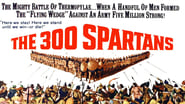TrueJoshNight
Truly Dreadful Film
Dorathen
Better Late Then Never
WillSushyMedia
This movie was so-so. It had it's moments, but wasn't the greatest.
Francene Odetta
It's simply great fun, a winsome film and an occasionally over-the-top luxury fantasy that never flags.
George Taylor
While the budget to this is probably a fifth of that of the better known 300 (which was influenced by this movie when Frank Miller saw it as a child), this is, even with the Spartans wearing Roman gear, the more faithful adaptation. The 300 march to thermopylae and die there, as commanded. But in doing so they save Greece. A really well done low budget film, well worth seeing. And it is available on Blu Ray.
arwen_mg
This is a solid film about a bold historical event. I love the no-non sense way of story telling and filming. It looks like they meant it to be as historical accurate as it was possible to be in 1962. It was filmed in Greece and, in good Hollywood tradition, it has a cast of thousands, in the form of the actual Greek army. Because this film is about a single historical event, one that most people know the outcome of before even seeing it, it could have been very boring, but they managed to make interesting, without making it too soapy of too historically inaccurate. The solid and uniform performances really help as well; it shows a unity of purpose which suits the story. The early 1960s were the heyday of these types of blockbuster films and this one is a solid example without going over the top like some. Definitely worth seeing.
James Hitchcock
The fifties and early sixties were the golden age of the epic movie, and many such productions during this era were based upon Classical history or mythology. This was also a period when the Cold War was at its height, and "The 300 Spartans", which tells the story of the war between the Persian Empire and a coalition of Greek city-states, was often seen as a commentary on contemporary political events. (It came out in 1962, the same year as the Cuban missile crisis). In the film, the Persian king Xerxes is depicted as a cruel tyrant whereas Greece is described as "the only stronghold of freedom remaining in the then known world". The movie also looks back to the days of the Second World War. Ralph Richardson's defiant speeches as the Athenian leader Themistocles have a quite deliberately Churchillian ring to them.A couple of changes appear to have been made to history to strengthen the audience's sense of identification with the Greek cause. Persia is described as a "slave empire", but no mention is made of the fact that slavery also existed in Greece at this period. The script calls the governing body of Sparta the "Senate", a Latin-derived word, although it is normally referred to, even in English, by the Greek equivalent, "Gerousia". The writers may have wanted to imply a chain of democratic continuity stretching from Ancient Greece to modern America via Rome. No mention is also made of the fact that the religion of Ancient Persia, Zoroastrianism, was a monotheistic one; Xerxes refers to "the gods". Someone evidently felt that viewers would be less likely to accept the Persians as the bad guys if they saw them as proto-Christians.The film centres upon the Battle of Thermopylae in which a small force of 300 Spartan warriors defended a narrow but strategic pass against a much larger Persian army. The Gerousia refuse to send the main Spartan army to fight because the invasion coincides with a religious festival during which warfare (including, it would seem, defensive warfare against an invading army) is forbidden. The Spartan king Leonidas is unwilling to accept this ruling and leads his personal bodyguard, which is not subject to the Gerousia's orders, against the Persians. (Leonidas is played by Richard Egan who two years earlier in "Esther and the King" had played a Persian monarch leading his army against the Greeks; that film gives a much more positive view of Ancient Persia than does this one). Despite their small numbers, the Spartans, with a few allies, are able to defeat several enemy attacks, to the point where Xerxes is seriously considering feigning a vision from the gods which will allow him to withdraw his forces without losing face. The Persians only prevail when a traitor shows them a goat-track through the mountains which enables them to attack the Spartans in the rear. Leonidas and his men are wiped out, but their sacrifice has bought the other Greek states enough time in which to organise and defeat the invader. A subplot deals with the romance between Phylon, a young Spartan warrior, and his sweetheart Ellas.The film does not really compare with the really great epics like "Ben Hur", "Spartacus" and "El Cid", although the difference is more one of scale than of quality. It appears to have been made on a smaller budget than those masterpieces, something most evident in the battle scenes. We are told that the Spartans are heavily outnumbered by the enemy, but we never see enough Persians in the same place at the same time to give us any real sense of this disparity in numbers. By most other standards, however, this is a pretty good film, certainly better than a lot of epics from the period, including "Esther and the King". Egan was particularly inert and wooden in the earlier film, but he must have spent the intervening two years taking acting lessons because he is much better here. The other main contributions, including from Richardson and from David Farrar as Xerxes, are also good. The film was actually shot in Greece, with the co-operation of that country's government, and the use of authentic, and visually attractive, locations, gives a greater sense of place than would have been possible by simply using the California hills to stand in for the mountains of Thermopylae. "The 300 Spartans" may not be a great classic like "Spartacus", but remains enjoyable Sunday afternoon viewing today. (I have never seen the modern remake, "300"). 7/10
barbarellaa
All in all, it's not a bad movie. But if you like Ancient History and have seen or read anything related to one of the most heroic and important moments of world's history (Persian Wars/Thermopylae), you'll probably feel that this movie has tried, but not really made the mark.My main feeling is the movie has lacked serious proper research. To start, the costumes are not even from the Greek period (V cent. BC) but actually later Roman (!) It is not just the acting pointing to the 60s but the superficial approach of the script (and direction) towards the motivations and personality of characters such as Leonidas, the Spartan King. Leonidas was brave but he did not take that lightly the battle and the decision to sacrifice himself and his army. He was the most respected king of Greece and Sparta the most powerful army. He knew his decision was going to shake Greece as an earthquake.A bit of research would have avoided the inconsequent laughs and silly smiles without sacrificing the story, adding key elements to give the audience the source of power of both kings (Leonidas = democracy/individual freedom; Xerxes = autocracy/submission fear) and the clash of civilisations that was about to happen.The romantic sub-plots are useless and do not help tell the story. Again, the historical sources are filled with interesting elements that could had add a lot more drama, and based on facts (as far we can tell).Although I don't want to, it is impossible not to compare with '300' from Frank Miller. Even discounting the highly graphical impact, that version has, undeniably, far better consistency in the historical elements. "The 300 Spartans" can be seen as entertainment but if you really love Ancient Greece, get Miller's 300 and then do yourself a favour and google Thermopylae. You will learn the facts having some fantastic visuals to match. Time travel guaranteed!





